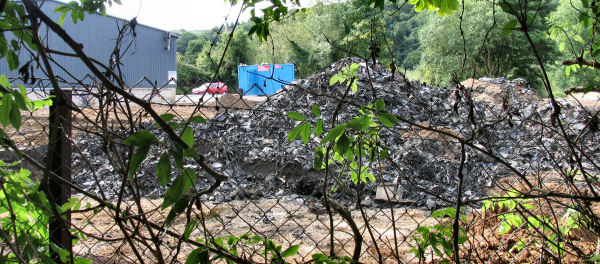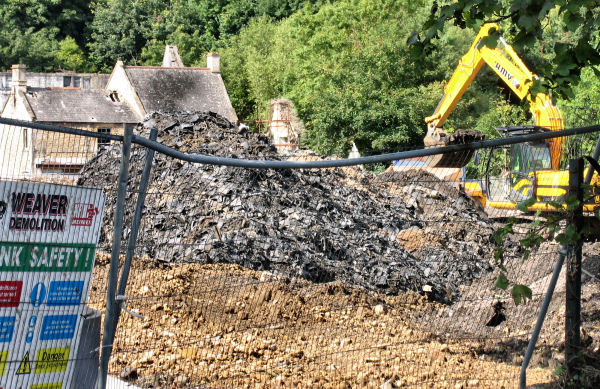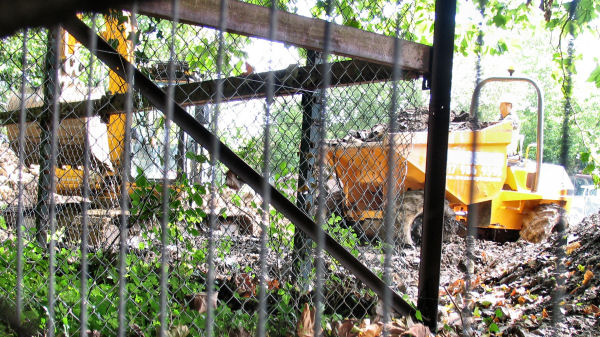Letter from a Former Employee at Peradins
I was not aware of Peradin
deliberately burying waste while I was there, and being in the engineering
and maintenance department I would have known about it going on.
Most of the waste oils etc were stored in the upper compound (near the
road left of entrance) and recovered by disposal &recovery companies, or
other items were taken to the unit in Trowbridge.
However I do remember seeing oil
slicks bubbling up in the river, but this was not surprising due to the
amount of hydraulic oil that used to leak out of the moulding presses into
the ground.
The ground in the lower right-hand
part of the factory area must be full of oil, unless it has drained away
by now.
However with the factory moving
there from Bath during the end of WW2 there is 40 years + of ground
contamination to get rid of.
There were plenty of what we term
toxic materials today, like raw rubber, oils, paints, carbon black etc,
but back in the 70s these were not seen as toxic or dangerous.
Trichloroethylene and Cyanide were
the materials we classed as toxic that were being used on site at the
time. What happened after I left, I do not know, but I cannot think of a
suitable area where they could have dumped waste within the site.
If it was not closed off I would
like to have a look around, but the buildings look unsafe so best stay
out. It may be the fact that the factory just leaked the stuff in the
ground over the years and the rumour about the toxic burial has grown from
there. Either way the ground is contaminated.
I am amazed that anybody would
think of building houses here unless they were on stilts. I remember
several floods, and in particular two big floods at the factory between 76
and 79. Both of these came up to just short of the toilet blocks, which is
approx half way up the property toward the entrance gates.
I lived in Bath and twice had to
go home via Bradford-on-Avon because the bridge outside the pub was
impassable. I presume this still happens today.
|
The contamination, rubber and other products, in the former car park that has
been mentioned to YPres Rose a few years ago has been found. Freshford Mill is
located within the Freshford and Sharpstone Conservation Area and within the
Cotswolds Area of Outstanding Natural Beauty and an area of Special Scientific
Interest. What should happen with the waste that is shown below is surely remove
it and take it to a place where it can be properly and safely disposed of. What is
happening is that the contractors are taking the waste to another location on
site which is close to the river and burying it there. (2nd September
2008) On a visit today (9th September 2008) it would appear that the toxic waste
is just being stockpiled awaiting collection. |
|

The huge pile of rubber and
other evil smelling waste |
|
|
|
 |
|
Tipper truck being loaded
with waste |
|
 |
|
Tipper delivering waste to
be re-buried close to the river Frome on the same site |
Nature Reserve will be Contaminated?
I understand that the place where the contaminated material is being buried
is the place that is designated as a nature reserve. But whether that is the
case or not this material if allowed to remain buried will leach into the river
Frome even more so than in its present location. I am glad to note
(January 09) that the toxic waste is now covered with tarpaulins which will
prevent contaminated rainwater from being leached back into the ground.
Apparently, we were alarmed for no good reason as the waste is being
stockpiled pending its safe removal. to quote from a company spokesman:
"The timing of waste removal is not a simple
matter of dig and collect, it requires agreement from various regulatory bodies
hence the stockpiling until these procedures are complete."
So it appears that any contamination will be in the short term. Of course if
the same regulatory bodies had done their job properly - the toxic waste
wouldn't be there anyway! The third photograph clearly shows (notwithstanding
the fence and railings) that the ground is level. As the ground is level then
the tipper must be arriving with its first load of waste to be stockpiled. Not
true, I had witnessed the tipper going backwards and forwards several times
while I was observing the works. Therefore either there was a hole to put the
waste into or a hole had been made. This area is a level area with the car park,
with no hole that I recall that could be filled. Therefore, if my observation
(about there being no existing hole) is true then waste was being buried, even
though it is not now.
|
Return to Freshford Mill |